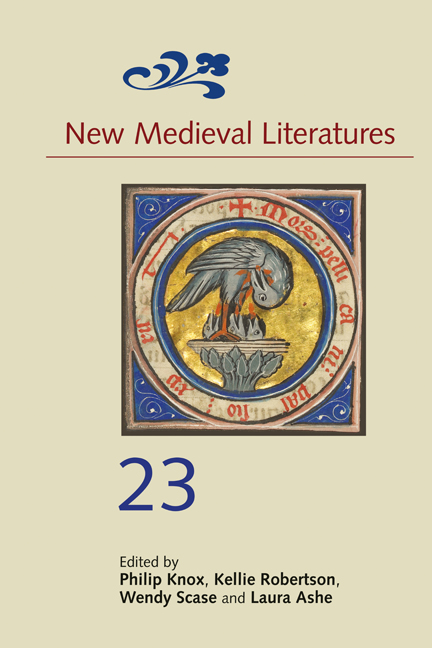Book contents
- Frontmatter
- Contents
- List of Illustrations
- Editors’ Note
- List of Abbreviations
- 1 A Paradox, (Un)Identified: Grendel’s Mother and the Lacanian Real
- 2 What Christ Might Say: Adapting the Last Judgment in the Prick of Conscience and Humbert’s De Dono Timoris
- 3 ‘At Jherusalem hyt ys goyd wyne’: The English Taste for the Sweet Blood of the Holy Land
- 4 The Bright Body: St Erkenwald’s Death Investigation
- 5 The Occasion of Chaucer’s Boece
- 6 ‘We axen leyser and espace’: Narrative Grace in Chaucer’s Franklin’s Tale and Melibee
- 7 The Shapes of the Speculum Christiani: Scribal Technique and Literary Aesthetics in Fifteenth-Century England
3 - ‘At Jherusalem hyt ys goyd wyne’: The English Taste for the Sweet Blood of the Holy Land
Published online by Cambridge University Press: 11 January 2024
- Frontmatter
- Contents
- List of Illustrations
- Editors’ Note
- List of Abbreviations
- 1 A Paradox, (Un)Identified: Grendel’s Mother and the Lacanian Real
- 2 What Christ Might Say: Adapting the Last Judgment in the Prick of Conscience and Humbert’s De Dono Timoris
- 3 ‘At Jherusalem hyt ys goyd wyne’: The English Taste for the Sweet Blood of the Holy Land
- 4 The Bright Body: St Erkenwald’s Death Investigation
- 5 The Occasion of Chaucer’s Boece
- 6 ‘We axen leyser and espace’: Narrative Grace in Chaucer’s Franklin’s Tale and Melibee
- 7 The Shapes of the Speculum Christiani: Scribal Technique and Literary Aesthetics in Fifteenth-Century England
Summary
In 1353, a London tavern run by Francisco of Genoa and Panino Guillelmi, the servant of Francisco de Spynola of Genoa, was forcibly closed down by the Mayor and Alderman of London for illicit practices. The crime: the men had stocked ‘two adjoining cellars […] and have stowed away wines of Crete and other sweet wines in one of the said cellars, and red and white wines in the other cellar, for making sale of in the same tavern’. It was illegal to sell sweet and non-sweet wines together, under pain of imprisonment. The case was serious enough that the accused sought aid directly from Edward III, who was sympathetic to their cause. On 24 February 1353, Edward III wrote a royal injunction ‘in favour of two Genoese, keeping tavern in the City’ to the mayor and sheriffs of London: ‘wishing to act graciously as towards the same Francisco and Panino […] to the end that other alien merchants may not thereby be minded to decline to come to the said city with their wines and merchandises’. The anxiety is palpable in Edward III's letter: the idea that Italians might stop travelling to England with their wines would be a terrible outcome.
The closure of Francisco and Panino's tavern, and its royally backed reopening, are events which are only explicable in the context of a culture deeply preoccupied with the symbolism and practical availability of sweet wines. The category of sweet wine was celebrated and policed, distinguished from the ‘ordinary’ wines of Gascony or Bordeaux. The labelling of wines as the produce of ‘Tyre’ or ‘Antioch’ – the former Syrian crusading cities, now Sūr in modern-day Lebanon, and Antakya in Turkey – recalled the lost Christian settlements, even as these products were known to have travelled from Mediterranean marketplaces. The knowledge of the unassailable Muslim governance of the Holy Land, consolidated with the 1291 fall of Acre [’Akka/’Akko], weighed heavily over late medieval Christian identity. After the Christian failures of the crusades, the sense of loss – of territory, of power, of status – resulted in a state of mind which, borrowing the terminology of theorist Paul Gilroy, I term post-Acre melancholia. In Gilroy's analysis of contemporary British society, postcolonial melancholia describes a neurotic syndrome dating to the decline of the British Empire. For Gilroy, this syndrome is characterized by the refusal of cultural hybridity, combined with a love of exotica.
- Type
- Chapter
- Information
- New Medieval Literatures 23 , pp. 66 - 105Publisher: Boydell & BrewerPrint publication year: 2023



